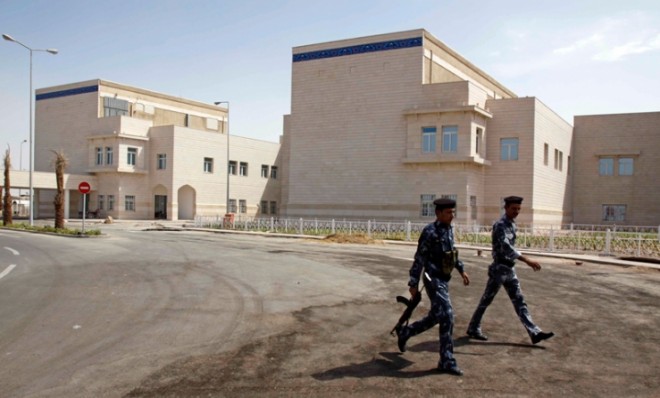How America wasted $8 billion rebuilding Iraq
A new report shines light on the waste and corruption that had American taxpayers blowing $1,500 per minute on reconstruction efforts

A free daily email with the biggest news stories of the day – and the best features from TheWeek.com
You are now subscribed
Your newsletter sign-up was successful
Look at your watch for 60 seconds. In that short amount of time, the United States wasted $1,500 of your money in Iraq, as the Atlantic Wire's Philip Bump helpfully points out.
That cash is part of the $8 billion that was wasted outright during the reconstruction process in Iraq, according to a new report by Stuart Bowen, the Special Inspector General for Iraq Reconstruction, a temporary watchdog group set up by Congress to monitor spending in Iraq. In total, the United States spent $60 billion rebuilding the country, the vast majority of which was not wasted. Still, add to the wasted $8 billion the $1 billion that the U.S. government lost to outright fraud, and 15 percent of the reconstruction budget went up in smoke.
How did things go awry? For starters, the United States had a habit of beginning large, ambitious projects without consulting Iraqis, resulting in squabbles over unfinished buildings like the Basra Children's Hospital, which, despite being 200 percent over budget, still isn't done four years after it was supposed to be.
The Week
Escape your echo chamber. Get the facts behind the news, plus analysis from multiple perspectives.

Sign up for The Week's Free Newsletters
From our morning news briefing to a weekly Good News Newsletter, get the best of The Week delivered directly to your inbox.
From our morning news briefing to a weekly Good News Newsletter, get the best of The Week delivered directly to your inbox.
Construction on a prison in the Diyala province started in 2004. After $40 million was spent, there are now no plans to finish it. The country's former finance minister, Rafie al-Issawi, complained to the New York Times that project managers "operated as though they were in a vacuum," rarely stopping to ask Iraqis for input. The lesson, according to Bowen, is "the more unstable the situation, the smaller the project should be."
Then, of course, there was rampant corruption — both within the Iraqi and American ranks. Al-Monitor points to the $1.3 billion spent on an Iraqi "quick-reaction force" that mostly "went for bribes and substandard equipment, including Russian helicopters that could not fly." Then there was the case of U.S. Army Major John Cockerham, who was sentenced to 17.5 years in prison for leading a conspiracy to siphon millions of dollars from defense contracts.
Also problematic was the Commanders' Emergency Response Program, a $4 billion fund that Wired's Spencer Ackerman describes as "basically walking-around-money, distributed at the discretion of military commanders, to hire Iraqis to work on short-term, high-value projects." Records on how that money was spent are largely incomplete.
Ultimately, the chaotic political situation in Iraq made it difficult to spend money effectively. As the Huffington Post puts it, "the flood of U.S. dollars into the country had fostered a 'triangle of political patronage' among Iraq's political parties, sectarian groups and government officials that sparked corruption and terrorism." Christian Caryl at Foreign Policy blames "a focus on the minutiae of building democratic institutions (like a constitution and a parliament) at the expense of the bigger job of redesigning the fundamental political settlement in the country — in other words, how power would actually be divided up among Shiites, Sunnis, and Kurds."
A free daily email with the biggest news stories of the day – and the best features from TheWeek.com
Was the entire endeavor worth it? Bowen's opinions seem mixed:
If we had better controls and better planning, better oversight, better quality assurance, better quality control all in places, we would have wasted less — for sure. There is no doubt about that. But did we achieve important things? Yes. [Bloomberg Businessweek]
The lessons learned from Iraq probably won't be all that helpful in Afghanistan, where military operations are supposed to end in 2014. The amount spent on reconstruction there? $90 billion.
Keith Wagstaff is a staff writer at TheWeek.com covering politics and current events. He has previously written for such publications as TIME, Details, VICE, and the Village Voice.
-
 Switzerland could vote to cap its population
Switzerland could vote to cap its populationUnder the Radar Swiss People’s Party proposes referendum on radical anti-immigration measure to limit residents to 10 million
-
 Political cartoons for February 15
Political cartoons for February 15Cartoons Sunday's political cartoons include political ventriloquism, Europe in the middle, and more
-
 The broken water companies failing England and Wales
The broken water companies failing England and WalesExplainer With rising bills, deteriorating river health and a lack of investment, regulators face an uphill battle to stabilise the industry